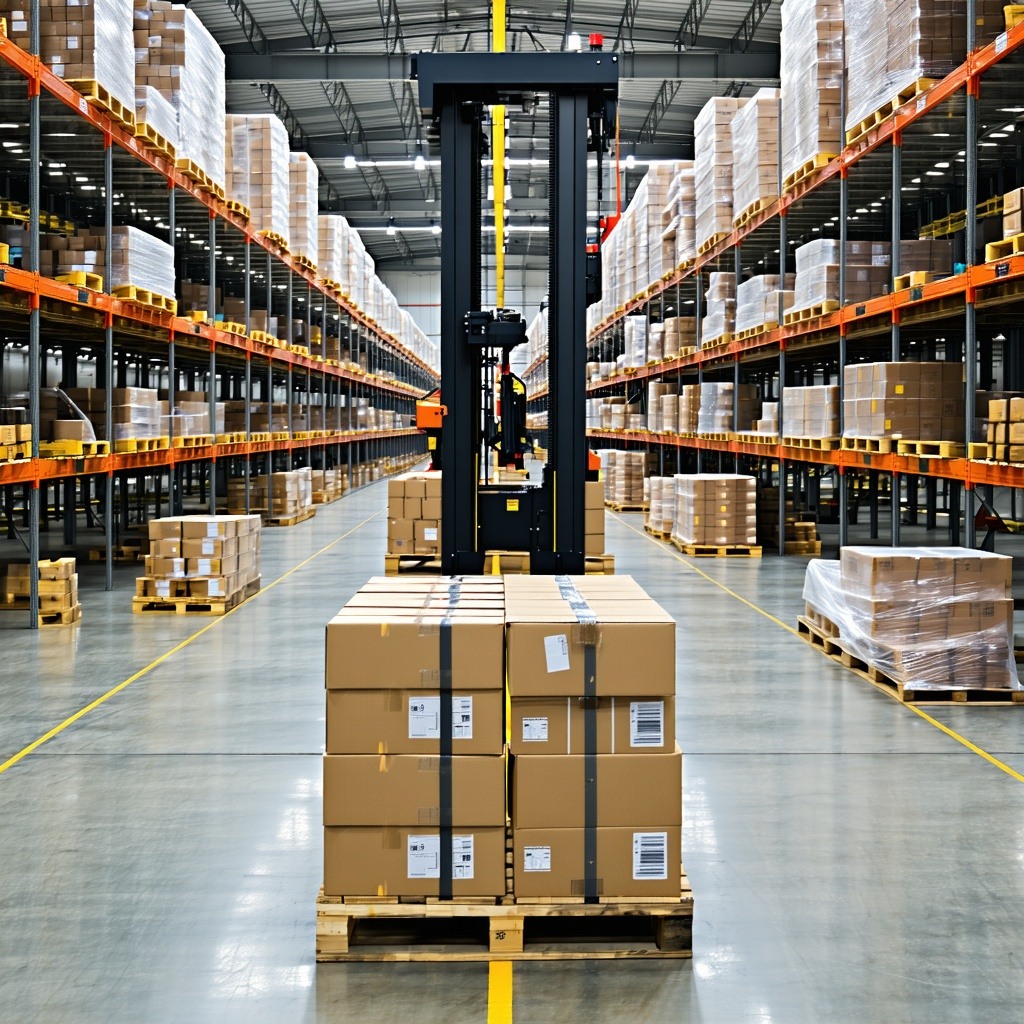Shipping Software for Manufacturing: Challenges and Solutions

What we’ll cover
Introduction
Manufacturing and industrial goods businesses operate on a large scale. They require precise logistics to manage the transport of raw materials, machinery, and finished products. From handling oversized freight to ensuring smooth multi-location distribution, efficient shipping plays a vital role in maintaining production timelines and cost efficiency. With global industrial output on the rise, businesses must adopt advanced shipping software to prevent logistics bottlenecks and ensure seamless delivery operations.
The industrial and manufacturing sectors are expected to grow by 11.2% between 2024 and 2029. It reflects an increased demand and complexity in supply chain operations. However, rising freight charges, supply chain disruptions, and customs regulations pose significant challenges. Delayed or inefficient shipments can result in production slowdowns, increased costs, and dissatisfied customers.
To stay competitive, manufacturers must address these hurdles with AI-driven logistics automation, multi-carrier integrations, and real-time tracking solutions. This article explores the key challenges in manufacturing and industrial shipping and highlights effective solutions to enhance logistics efficiency.
Key challenges in shipping for manufacturing & industrial goods & their solutions
Manufacturing and industrial shipping involve unique logistical challenges, from heavy-load freight handling to cross-border regulatory compliance. Below, we explore six critical challenges and the innovative solutions that help businesses optimize shipping efficiency.
🚨Challenge #1: Managing heavy & oversized shipments
Manufacturers ship large and often irregularly shaped goods, such as machinery, vehicle parts, and industrial equipment. These shipments require specialized handling and careful cost management to ensure safe delivery.
Issue: Manufacturing businesses deal with bulk orders, oversized machinery, and fragile equipment, leading to high shipping costs and delays.
Heavy and oversized shipments may be designated as hazardous material. Hazmat shipments or those like them often incur higher freight charges, require specialized carriers, and face loading restrictions. Failure to optimize freight selection can lead to shipment delays, additional surcharges, and even cargo damage due to improper handling. Moreover, inefficient shipment planning results in underutilized truck space or costly multiple shipments instead of consolidated freight movement.
✅ Solutions
-
AI-powered freight optimization: Smart algorithms analyze shipment dimensions and select the best LTL (Less Than Truckload), FTL (Full Truckload), or Freight Forwarder for cost-effective shipping.
-
Dimensional weight pricing calculations: Automated tools calculate shipping costs based on weight, size, and volume, ensuring accurate pricing and cost savings.
-
Specialized carrier selection: AI-based software automatically assigns shipments to heavy-load carriers equipped with cranes, liftgates, or flatbeds for secure transport.
🚨Challenge #2: Handling multi-location & cross-border shipments
Manufacturers frequently operate across multiple regions and countries, requiring seamless international shipping and regulatory compliance.
Issue: Industrial goods often need multi-leg, multi-location shipping, leading to tracking gaps and customs clearance delays.
Cross-border and international shipments face logistical roadblocks, including customs clearance delays, inconsistent documentation standards, and tracking challenges. Without proper planning, shipments can get held up due to incorrect or missing shipping documents, resulting in longer transit times and unexpected fees. Additionally, coordinating multiple orders across different locations without automation can lead to inefficiencies in warehouse allocation and inventory mismanagement.
✅ Solutions
-
Multi-warehouse & cross-border optimization: AI-based warehouse selection allocates shipments to the nearest fulfillment hub for faster international shipping.
-
Real-time customs compliance & documentation automation: Digital shipping documents, commercial invoices, and trade compliance checks reduce customs hold-ups.
-
Global carrier integrations: A multi-carrier shipping software solution enables seamless coordination between air, sea, rail, and road freight.
🚨Challenge #3: Lack of real-time shipment visibility & tracking
Industrial goods often go through multiple touchpoints, making real-time tracking information critical for avoiding lost shipments and delayed production timelines.
Issue: Multiple touchpoints in industrial shipping make it challenging to track shipments end-to-end, leading to missed deliveries & high WISMO (Where Is My Order?) inquiries.
Without centralized tracking, businesses struggle with shipment visibility, leading to increased WISMO (Where Is My Order?) inquiries. Industrial shipments frequently change hands multiple times, making tracking fragmented and unreliable. Businesses that rely on manual tracking methods struggle with delays in communication, inaccurate estimated delivery dates, and increased costs associated with lost or missed deliveries.
✅ Solutions
-
Centralized tracking dashboard: A real-time tracking system provides complete shipment visibility, from raw materials to final delivery.
-
Automated customer & vendor notifications: AI-powered alerts update customers and vendors on delivery status, reducing order-related inquiries.
-
AI-powered delay predictions: Advanced analytics detect potential delays and recommend rerouting options for uninterrupted supply chain operations.
🚨Challenge #4: High logistics costs & inefficient carrier selection
Shipping industrial packages requires cost-effective carrier selection to control expenses while ensuring on-time deliveries. Avoiding manual errors like double data entry and incorrect carrier selection can be crucial at this stage.
Issue: Industrial shipping involves complex freight charges, long transit times, and volatile fuel costs.
Manufacturers struggle with fluctuating freight charges, fuel surcharges, and inefficient routing. Without proper carrier rate comparison, manufacturers often overpay for freight services or fail to negotiate better deals. Additionally, relying on a single carrier increases the risk of service disruptions and capacity shortages. That leads to higher costs and delayed shipments.
Solutions
-
AI-driven carrier rate comparison: Automated rate shopping selects the best-priced carriers for bulk & freight shipping, keeping in mind specialized or new features.
-
Route optimization: AI-powered software analyzes delivery routes to ensure cost-effective and timely deliveries.
-
Dynamic freight rate shopping: Real-time analytics adjust freight charges based on fuel costs, demand, and carrier performance.
🚨Challenge #5: B2B order fulfillment & Just-in-Time (JIT) shipping
Many industrial businesses rely on Just-in-Time (JIT) logistics, where shipment delays can halt production.
Issue: Industrial manufacturers rely on Just-in-Time (JIT) logistics, where delays in raw materials or spare parts halt production.
A delay in the shipping process disrupts B2B operations, affecting both manufacturers and distributors. A minor delay in raw material deliveries can halt production lines, causing financial losses and production bottlenecks. If manufacturers fail to secure priority shipping, they may face unnecessary downtime and a negative impact on customer commitments.
✅ Solutions
-
Priority carrier allocation: AI-based shipping software assigns express freight carriers for JIT supply chains.
-
AI-powered demand forecasting: Machine learning predicts demand spikes, preventing stockouts and excess inventory.
-
Automated freight scheduling & load planning: Smart algorithms optimize shipment schedules, ensuring accurate and timely freight movement.
🚨Challenge #6: Returns & reverse logistics for industrial goods
Industrial returns involve damaged equipment, defective parts, and warranty claims, making reverse logistics management critical.
Issue: Managing damaged, defective, or warranty-based returns is complex in B2B manufacturing logistics.
Processing returns for bulky, high-value industrial goods is far more complex than standard eCommerce returns. The process involves verifying defects, arranging specialized return shipments, and ensuring regulatory compliance. Without automation, businesses struggle with slow return processing, high costs, and improper handling of returned goods.
✅ Solutions
-
Automated returns processing: AI-driven workflows streamline repair, replacement, and refund procedures.
-
AI-based damage & fraud detection: Smart sensors detect damage or fraudulent return attempts, reducing financial losses.
-
Reverse freight optimization: Automated software selects cost-effective return carriers while ensuring compliance.
How ClickPost helps manufacturing & industrial goods companies scale shipping automation
ClickPost offers an end-to-end B2B logistics solution. It helps manufacturers and industrial goods businesses automate shipping, reduce costs, and enhance operational efficiency.
ClickPost standout features:
-
Smart Carrier Selection: AI-powered rate comparison for bulk freight and oversized shipments.
-
Real-Time Shipment Visibility: A centralized dashboard with tracking information for all outbound shipments.
-
Multi-Carrier Integrations: Support for domestic and international carriers, including air, sea, and rail freight.
-
Automated Freight Scheduling: AI-based load planning optimizes shipment schedules and reduces transit times.
-
Digital POD (Proof of Delivery): Streamlined electronic proof of delivery to improve record-keeping and dispute resolution.
With ClickPost’s seamless integration, manufacturers gain 90% improved shipment visibility, faster deliveries, and automated compliance management.
Streamline your shipping experience with ClickPost

The final thoughts: Getting over industrial shipping challenges
Industrial and manufacturing supply chains are evolving, and logistics automation is the key to staying competitive. Companies that invest in AI-driven freight management, multi-carrier networks, and predictive analytics will overcome logistics challenges and enhance operational efficiency.
By leveraging ClickPost’s advanced shipping solutions, manufacturers can reduce costs, streamline processes, and meet growing industry demands. As industrial production scales globally, smart shipping solutions will define the next era of manufacturing logistics.


.png?width=879&height=549&name=Page%2074%20(1).png)